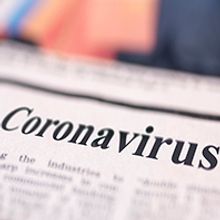Comment: The importance of becoming intelligent consumers of scientific information and COVID-19
Issue: Fleming Prize Winners
20 October 2020 article

For many years, Microbiology Today has been a beacon of truth in a confused world. I have personally benefitted from the range of articles and new knowledge. My horizons were widened and in turn I used the new knowledge to inspire and influence the minds of the students I help mentor.
University of Virginia student, Ms Ciara Smith, and I wish to address an important issue that has surfaced as a result of the recent pandemic that has and is impacting all of our lives.
The effects of the current pandemic are staggering, and it is difficult for one to wrap one’s head around just how extensive the implications of the disease will be. Our society and our own mental processes have become seriously addicted to social media and false news. It is a fact that the average person’s trusted advisors are news outlets that are not accurately representing the disease. A frenzy of undocumented statements that you could get infected by contracting the virus from dry surfaces, the air we breathe in wide open areas, implying that the virus is flying around, is reminiscent of the early days of HIV when people, even in low-risk areas, left their jobs in healthcare-related fields for fear of getting infected. It took several years for the learning process of the facts to settle in that you could only get infected with HIV through sexual contact and blood. Unfounded COVID-19 fears have led to panic purchases of gallons of hand sanitiser by little known companies, regardless of alcohol content and irrational behaviour patterns. There has been no pause and focus on educating the public on the basic germ theory of disease. Our society has become paranoid with the frenzy of false statements – “…he said, …she said”. As a result of the daily bombardment of inaccurate statements, people have grown to be suspicious and cynical of respected medical authorities of the likes of Dr Anthony Fauci, Dr Deborah Birx, the Centers for Disease Control and Prevention (USA), the London School of Hygiene and Tropical Medicine (UK) and the Johns Hopkins Coronavirus Resource Center global data map updated every hour (24/7) – a gold standard. Our health should be a higher priority than TV views and ratings. The fastest way to get close to normalcy will involve sacrifices by all and a trust in those who have spent their lives studying past pandemics, epidemiology and viral virulence.
In the face of this barrage, the desire to let our minds and our thinking be influenced by accurate information pales in comparison. Maybe it is time to ask ourselves the questions, “is the source of this information credible? Are statistics being used to draw in consumers and create an illusion of truth?” After all, all of us professionals are aware that a lie repeated enough times would make you believe it is the truth. For example, that COVID-19 resulted from a secret bioterrorism plot that originated in the US and then moved to Wuhan by secret agents.
We are encouraged by the fact that a mission of Microbiology Today is to teach all of us (who have open minds) to become intelligent consumers of scientific information to reason and understand why we believe what we believe – now more than ever before. Perhaps we should consider distancing ourselves from individuals, news outlets and so-called ‘journalists’ who try to instill fear in us with undocumented irrational statements that cannot be proven so all of us could become intelligent consumers of scientific information.
Arthur P. Guruswamy
Scientist (retired), Consolidated Labs, Richmond Virginia, USA (US Dept. of Homeland Security)
[email protected]
+1 804 559 4692
Ciara Noelle Smith
Student, University of Virginia. USA
[email protected]
+1 434 924 3072
